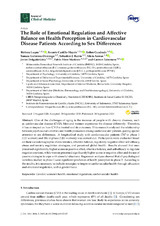Mostrar el registro sencillo del ítem
The Role of Emotional Regulation and Affective Balance on Health Perception in Cardiovascular Disease Patients According to Sex Differences
| dc.contributor.author | Luque Salas, Bárbara | |
| dc.contributor.author | Castillo Mayén, Mª del Rosario | |
| dc.contributor.author | Cuadrado, Esther | |
| dc.contributor.author | Gutiérrez Domingo, Tamara | |
| dc.contributor.author | Rubio García, Sebastián | |
| dc.contributor.author | Arenas Moreno, Alicia | |
| dc.contributor.author | Delgado-Lista, Javier | |
| dc.contributor.author | Pérez-Martínez, Pablo | |
| dc.contributor.author | Tabernero Urbieta, Carmen | |
| dc.date.accessioned | 2020-10-01T09:24:38Z | |
| dc.date.available | 2020-10-01T09:24:38Z | |
| dc.date.issued | 2020 | |
| dc.identifier.uri | http://hdl.handle.net/10396/20482 | |
| dc.description.abstract | One of the challenges of aging is the increase of people with chronic diseases, such as cardiovascular disease (CVD). Men and women experience the disease differently. Therefore, it has an impact on how CVD is treated and its outcomes. This research analyzed the relationship between psychosocial variables and health promotion among cardiovascular patients, paying special attention to sex differences. A longitudinal study with cardiovascular patients (747 in phase 1 (122 women) and 586 in phase 2 (83 women)) was carried out. Participants were evaluated based on their sociodemographic characteristics, affective balance, regulatory negative affect self-efficacy, stress and anxiety regulation strategies, and perceived global health. Results showed that men presented significantly higher scores in positive affect, affective balance, and self-efficacy to regulate negative emotions, while women presented significantly higher scores in negative affect and the use of passive strategies to cope with stressful situations. Regression analyses showed that all psychological variables studied in phase 1 were significant predictors of health perception in phase 2. According to the results, it is necessary to include strategies to improve cardiovascular health through education and emotional regulation, with a gender focus. | es_ES |
| dc.format.mimetype | application/pdf | es_ES |
| dc.language.iso | eng | es_ES |
| dc.publisher | MDPI | es_ES |
| dc.rights | https://creativecommons.org/licenses/by/4.0/ | es_ES |
| dc.source | Journal of Clinical Medicine 9(10), 3165 (2020) | es_ES |
| dc.subject | Gender | es_ES |
| dc.subject | Women’s health | es_ES |
| dc.subject | Emotional regulation | es_ES |
| dc.subject | Cardiovascular health | es_ES |
| dc.title | The Role of Emotional Regulation and Affective Balance on Health Perception in Cardiovascular Disease Patients According to Sex Differences | es_ES |
| dc.type | info:eu-repo/semantics/article | es_ES |
| dc.relation.publisherversion | https://doi.org/10.3390/jcm9103165 | es_ES |
| dc.relation.projectID | Gobierno de España. PSI2014–58609-R | es_ES |
| dc.relation.projectID | Gobierno de España. PDI2019-107304RB-I00 | es_ES |
| dc.rights.accessRights | info:eu-repo/semantics/openAccess | es_ES |

